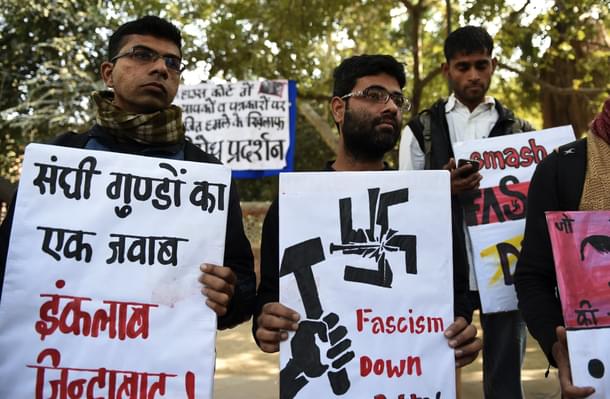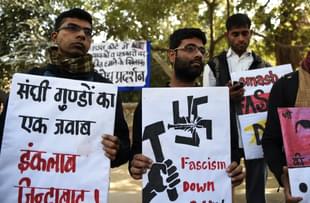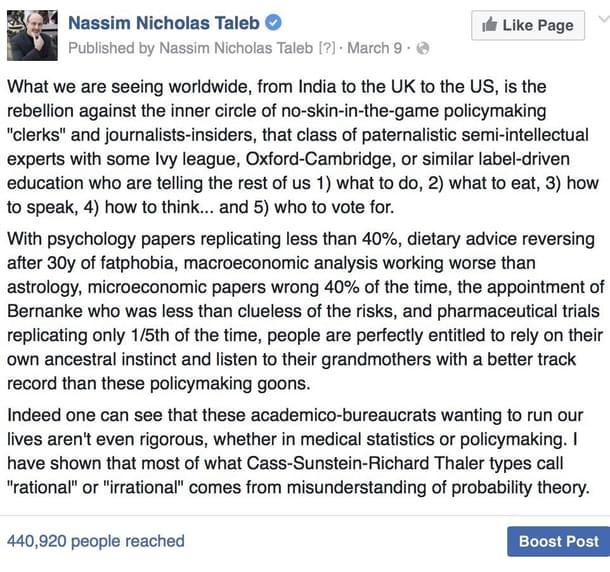Politics
Let’s Retire The Word ‘Liberal’ And Use ‘Alt-Left’ Or #SJW Instead
Rajeev Srinivasan
Nov 27, 2016, 10:37 AM | Updated 10:37 AM IST
Save & read from anywhere!
Bookmark stories for easy access on any device or the Swarajya app.


The word ‘liberal’ has been so overloaded with meanings that it is, in essence, meaningless and a euphemism. It is high time we threw it away and called a spade a spade. The problem with it is that it sounds like a good thing. How could anybody not want to be a liberal? It conjures up visions of all that is bright and good and decent.
How did we get to a point where this perfectly fine word is now poison?
First, there is the constant use in the West of this term to mean 'Western dominance' basically. In their standard narrative, as in the New York Times, the Economist, the Financial Times, the term “liberal international order” is used to convey what is primarily American domination of the world. Sometimes its synonym, ‘rules-based global order’ is also used. Another near-synonym is ‘Washington Consensus’.
So far as I can tell, it is a harking back to a supposed Golden Age of the 1950s and 1960s when America reigned more or less supreme, the unquestioned superpower. In pursuit of its own interests, it set up a series of institutions and rules that enabled it to act as a benign (and sometimes not-so-benign) dictator. And those interests? The best articulation was supposedly by George Kennan, the famous ‘X’ who anonymously codified the Cold War. I paraphrase:
America has 8% of the world’s population, but enjoys 50% of its resources. The objective of American foreign policy is to keep it that way.
Which meant, in practice, that America pursued policies in pursuit of foreign resources, especially hydrocarbons. It also prosecuted wars to contain what it perceived as its mortal enemy, the Soviet Union. And since America had a significant competitive advantage in many areas, based on its ability to innovate, and its huge domestic market, most of the time, the trade would end up in America’s favour. And if it didn’t, there was always the massive arms trade.
There is nothing particularly liberal about all this. It means that where the West had an advantage, they would force open others’ markets (e.g., for the free flow of goods and capital), but where they had a disadvantage, they would erect trade barriers (e.g., for protecting their farmers and against the free flow of labour). ‘Fair trade’, not free trade.
But a mythology has been built up around these things, which we have all swallowed hook, line and sinker. No, it is not Ram Rajya that they built up, or the City on the Hill, but just a nice little ‘arrangement’ that suited them.
Ironically, the very ‘liberals’ who support this alleged ‘liberal world order’ are quick to support every little tin-pot dictator who oppresses his subjects, because it suits their geopolitical aims.
Exhibit A: Pakistan. Exhibit B: Persian Gulf kingdoms. Exhibit C: Pinochet’s Chile. You get the drift. In Latin America, they also send ‘advisors’ to teach oppression: see the powerful film State of Siege.
And despite all their protestations about their love of democracy and so forth, it was the so-called ‘liberals’, those who had supported Hillary Clinton, who rioted in the streets to overturn the results of what appears to be a fair, though bitterly-fought, election. So they like every election result so long as their candidate wins. Fascism by other means.
The big takeaway from Trump’s victory, Brexit, etc., is that ‘liberalism’ is dead. It is not clear how the word ‘liberal’ came to be associated with a set of ideas that are far removed from the dictionary meaning of the word (as “open to new ideas”). In practice, the ‘liberal’ world-view, as articulated by those who self-identify themselves as such, tends to be closed-minded, bigoted and downright dogmatic. Nevertheless, it is great marketing for those who are purveyors of blind faith.
Some years ago, a self-confessed ‘liberal’, Jonathan Haidt, wrote a book titled ‘The Righteous Mind: Why Good People are Divided by Politics and Religion’. He showed that the ‘liberals’ are in fact much more close minded than ‘conservatives’ because the former tend to be oblivious to major ideas. He identified six values in an ethical system: compassion, fairness, the desire to fight oppression; group loyalty, respect for authority and the notion of sanctity. Haidt showed that ‘liberals’ simply cannot understand the last three, which are perfectly appropriate values.
In other words, ‘liberals’ can only deal with a world view that consists of nuclear families, industrialisation, and radical individualism. They cannot even conceive of something like nationalism, or hold something sacred: they have to deconstruct these things, as, for example, Sheldon Pollock is attempting to do, in desecrating Sanskrit.
These ‘liberals’ have also succeeded in diluting the content of much academic and scientific research because they are polemicists first and foremost, not honest seekers after the truth as they claim to be. Almost all their work is half-baked, and despite their superficially appealing ideas, they are not trustworthy, especially in the social sciences that they dominate. Earlier this year, Nassim Nicholas Taleb stated the following, and it is a beautifully succinct exposition of what I am trying to articulate:

It is time to call out these villains. For a long time, I have ceased to use the term ‘liberal’ concerning India’s self-proclaimed ‘liberals’ and ‘left-liberals’, because they are simply ‘left’. And a sort of virulent Left, which means they are mostly Stalinists, fascists of the Left, though they profess to be horrified by fascism. Let us retire this clichéd term ‘liberal’, therefore, and replace it with something more accurate.
The best name I can think of is #SJW, the pejorative term meaning ‘social-justice warrior’, essentially one of those urban-guerilla-wannabes skewered so mercilessly by Vivek Agnihotri in Buddha in a Traffic Jam. I have recently seen the term ‘Alt-left’, in analogy with the Alt-right in the US (I saw this first being used by Rupa Subramanya, so in the absence of any other data, I credit her with inventing it too). That is also an acceptable term. Let us use either of these names to refer to these people.
We in India should be used to nomenclature terrorism, as it has been used as a deliberate Goebbelsian tactic of propaganda. Some perfectly harmless, or even attractive, words are now twisted beyond recognition in the Indian discourse. In an alarmingly Orwellian way, some of them now mean the very opposite of the dictionary meaning of the term. Indeed, Orwell would easily recognise the Party’s slogans from 1984 in India:
...war is peace, freedom is slavery, ignorance is strength.
Here ‘secularism’ means the total intrusion of religion into daily life, and ‘progressives’ are sickly regressive, because they induce everybody to be ‘more backward’ than everybody else, thus creating a race to the bottom, not to the top. Yes, in India, ‘liberal’ has become a mark of sin, not of virtue. These people are not liberal in the dictionary sense of the term. Let’s call them alt-Left or #SJW.
Rajeev Srinivasan focuses on strategy and innovation, which he worked on at Bell Labs and in Silicon Valley. He has taught innovation at several IIMs. An IIT Madras and Stanford Business School grad, he has also been a conservative columnist for twenty years.





